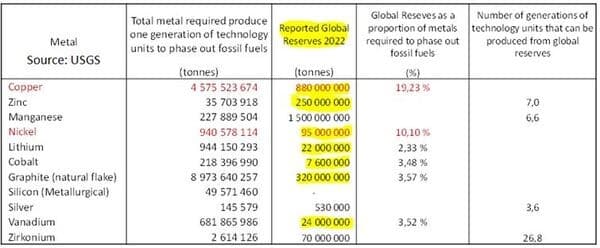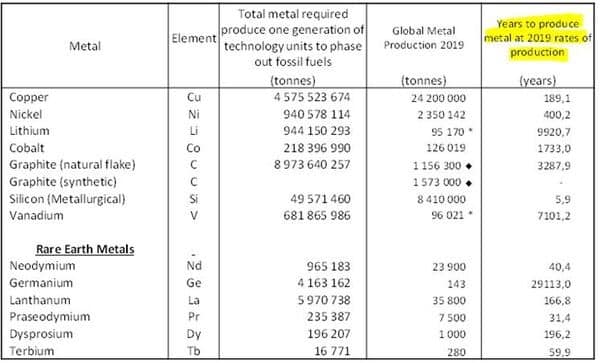
Many points are made when discussing the green energy agenda’s infeasibility. It has been noted that wind and solar can’t provide our energy needs, that powering the United States with wind would require an area three times California’s size. It has further been asserted that electric-car production and use actually cause more pollution than the gasoline status quo. It’s not just that electric vehicles’ manufacture creates massive releases of CO2 (not a pollutant, mind you), either; it’s also that the mining of the metals and minerals required for their production causes environmental damage. Yet there’s a kicker here, too, a point seldom made:
Even if we could more cleanly and efficiently mine the materials in question, there simply aren’t enough of them to make green energy a reality.
That’s the conclusion of a geological study that, not surprisingly, hasn’t gotten the attention it deserves. CounterPunch has reported on it, however, writing that the research
puts a damper on the prospects of phasing out fossil fuels in favor of renewables. More to the point, a phase out of fossil fuels by mid century looks to be a nearly impossible Sisyphean task. It’s all about quantities of minerals/metals contained in Mother Earth. There aren’t enough.
Simon Michaux, PhD, Geological Survey Finland[,] has done a detailed study of what’s required to phase out fossil fuels in favor of renewables, to wit:
“The quantity of metal required to make just one generation of renewable tech units to replace fossil fuels is much larger than first thought. Current mining production of these metals is not even close to meeting demand. Current reported mineral reserves are also not enough in size. Most concerning is copper as one of the flagged shortfalls. Exploration for more at required volumes will be difficult, with this seminar addressing these issues.” (Source: Simon P. Michaux, Associate Research Professor of Geometallurgy Unit Minerals Processing and Materials Research, Geological Survey of Finland, August 18, 2022 — Seminar: What Would It Take To Replace The Existing Fossil Fuel System?)
Michaux’s “comprehensive study found that the current estimated metal reserves are woefully deficient in almost every category,” American Thinker’s Robert A. Bishop added on Saturday. “The table below lists base and rare earth metals requirements to build the new grid and E.V.s. Deficits are yellow-highlighted. For example, copper is an integral part of a high-voltage grid system, coming up short by a shocking 3.7 billion tons. Can we dig enough open mile-deep ore pits to meet that shortfall? Improbable.”

Bishop continues, writing that below “is the study’s table estimating the years to produce the required metals at the current production rates. For example, lithium would take almost 10 millennia to achieve. In addition, these scarce minerals must be mined, transported, and processed, relying exclusively on fossil fuels, which would create more carbon emissions and deplete hydrocarbon reserves.”

“Petrochemicals from oil and natural gas make over 6,000 everyday products indispensable to modern society,” Bishop also points out. “There are no known alternative substitutes for hydrocarbons. Yet the climate change fanboys catastrophically ignore petrochemicals that provide many indispensible [sic] goods.”
Reality has a way of intervening, however (it’s just a matter of how much pain is required to penetrate deaf ears). As to this, the Ukraine war has had at least one positive byproduct. That is, “Europe’s embargo of Russian oil and natural gas, along with the terroristic sabotage of the Nord Stream pipelines, is exposing the myth of green energy,” Bishop further states. “As a result, Germany, the poster child for green energy, has resorted to heresy by reactivating its mothballed coal-fired power plants.”
“The math doesn’t support the net zero activist movement’s rhetoric,” Bishop concludes. “Eliminating indispensable fossil fuels, as Germany is experiencing at an accelerating rate, without replacing it with the equivalent of alternative energy, would quickly collapse modern society. Think of it as the ‘Jonestown Massacre’ on a global scale.”
Far from an exaggeration, this alarm has been sounded before. For example, former Greenpeace figure Patrick Moore warned in 2019 that if the Green New Deal were instituted globally, it could “result in the death of nearly all humans on Earth.” But before they met their miserable end, he pointed out, they’d cut down every tree for fuel and kill every animal for food.
That trying to artificially transform a worldwide economy with a big-government cudgel would have a devastating effect is not surprising: It has happened before. For example, in the 20th century, communist dictators such as the Soviet Union’s Joseph Stalin, China’s Mao Zedong, and Cambodia’s Pol Pot instituted agricultural collectivization schemes that caused the deaths of more than 60 million people.
The lesson is simple, too: If the market doesn’t justify a program or course of action, be more than hesitant to pursue it. This isn’t because the market is perfect (hey, it gives us the Kardashians!), but because it’s democracy as applied to economics; that is, every time hundreds of millions of people make purchases, they’re casting “votes” on what goods and services will prevail.
Echoing what Winston Churchill famously said about political democracy, the market is the worst system in the world, too — except for all the rest. It certainly was a better guide than Stalin, Mao, Pol Pot and their brain trusts. And what of today’s would-be economy-steering oligarchs, climate kid Greta Thunberg, extraterrestrial John Kerry, software-glitch-man Bill Gates, et al.? Do you want to bet they’ll be history’s first economic puppeteers whose collective wisdom will surpass that of the market’s invisible hand?




